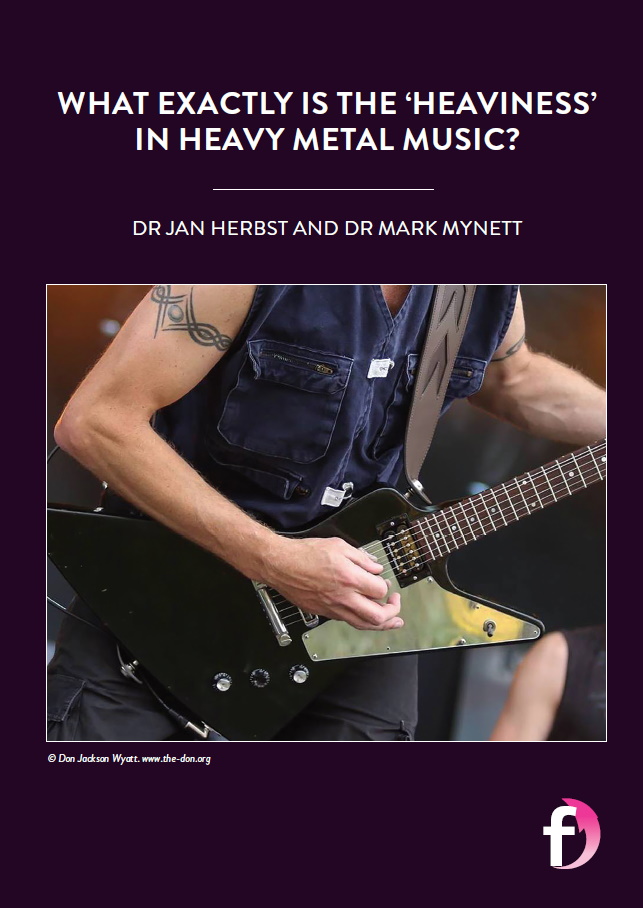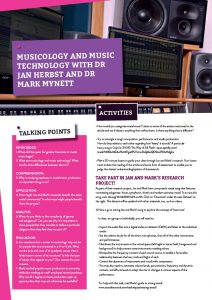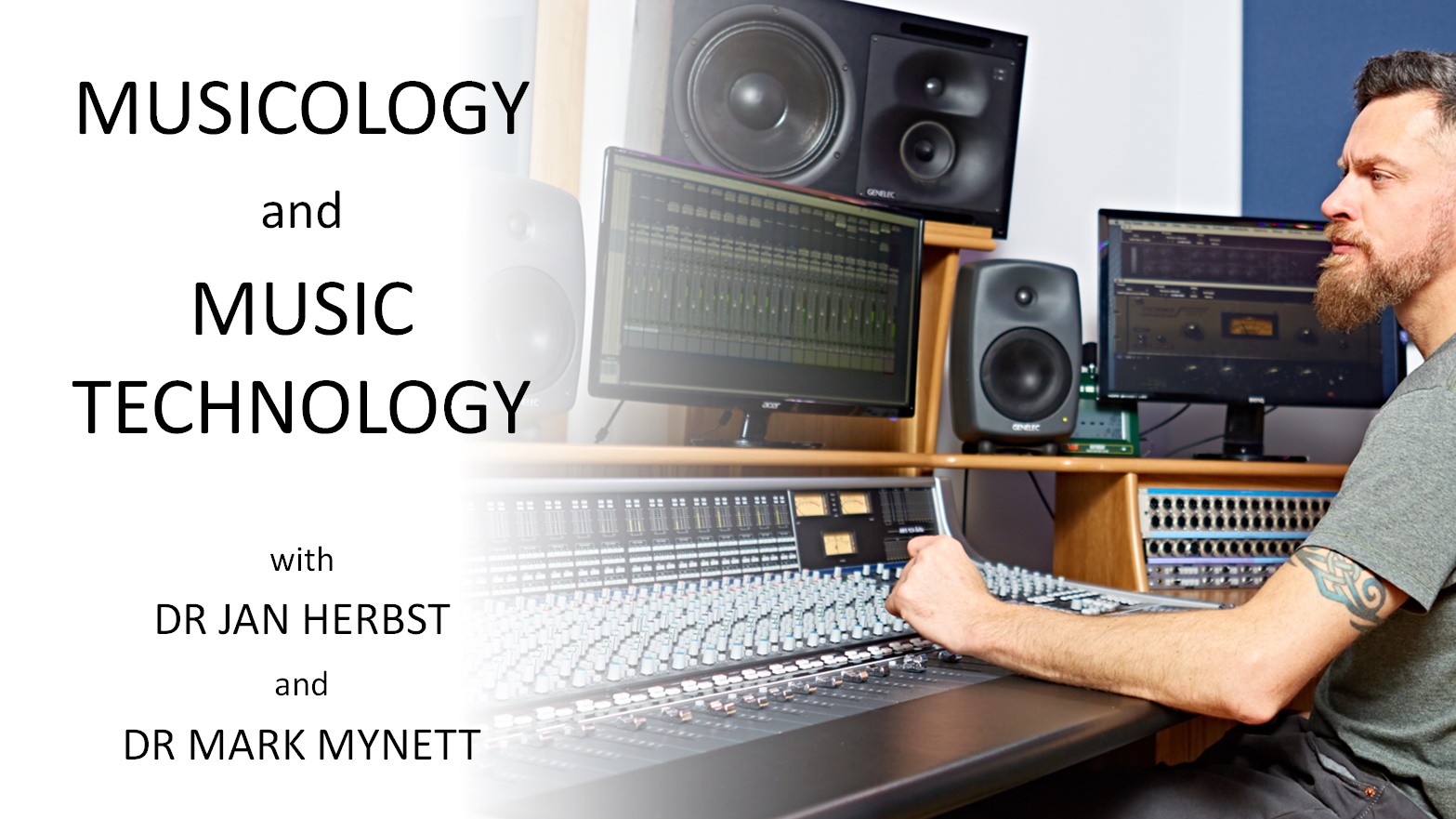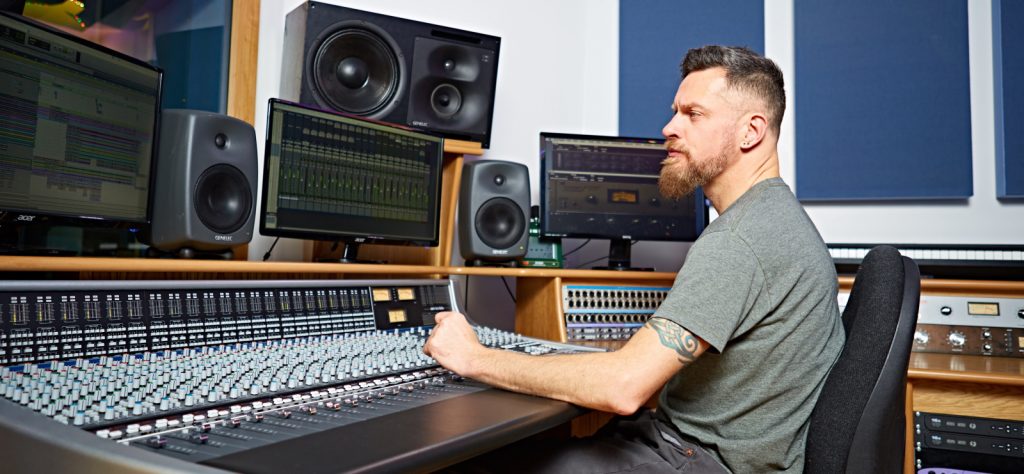What exactly is the ‘heaviness’ in heavy metal music?
Dr Jan Herbst and Dr Mark Mynett, based at the University of Huddersfield, are collaborating on a project that is investigating heaviness in heavy metal production. The findings will benefit all those interested in music production and metal music
Many people – fans of heavy metal music or otherwise – understand the sounds that constitute a genre of music, but what is ‘heavy’ in metal. Can you define it? Dr Jan Herbst and Dr Mark Mynett, both based at the University of Huddersfield, have embarked on a project titled ‘Heaviness in Metal Music Production’. They aim to find out what heaviness is in audio-recorded form.
“So far, Mark and I are more or less the only scholars who have studied musical heaviness,” explains Jan. “Mark has written his PhD on producing contemporary metal music and published his findings in a practical manual (Metal Music Manual).” Ultimately, Jan and Mark want to expand on this work and develop a theoretical model of what constitutes heaviness in contemporary metal music production with all variables and constraints, then offer that model to practising producers and self-producing artists.
WHY HAS METAL MUSIC BEEN ON A QUEST FOR GREATER HEAVINESS OVER THE PAST FEW DECADES?
In 1970, Black Sabbath, an English rock band, released their self-titled debut, which is said to have started the metal genre and was therefore the beginning of the quest for greater heaviness. Its importance can hardly be overstated. Perceived heaviness – which is metal music’s defining feature – can arguably be seen as the source of the listener’s pleasure.
“This artistic pursuit for greater heaviness and extremity was paralleled and supported by record production, which had to find creative and technical solutions to ever-greater complexity and demands for sonic quality and aggression,” explains Jan.
However, we must also consider the myriad – and highly personal – ways that any form of music can affect an individual. While some people might find solace in metal music, seeing it as a form of rebellion, there are those who will find it pleasing and enjoyable for entirely different reasons.
IS HEAVY METAL THE ONLY SUBGENRE WITHIN METAL MUSIC?
There are some subgenres of metal that are accepted by most metal fans, such as thrash, symphonic, gothic, death, black and doom metal, as well as a host of ‘core’ genres like metalcore or deathcore. But then there are ‘subgenres’ that are more of an interpretation of the main genres, like folk metal or Viking metal. In addition, progressive metal tends to describe the complexity of the music, rather than the subgenre. It is worth considering that, sometimes, the function of a subgenre is to be a badge of identity, where people align themselves with a particular subgenre for social and emotional reasons – in those instances, it is in the group’s interest to create their own defined subgenre.
HOW ARE JAN AND MARK CONDUCTING THEIR RESEARCH?
The team is looking at how seven leading metal producers – who specialise in different subgenres – define heaviness. From there, Jan and Mark will focus on how these producers process and control the aspects of heaviness during the mixing of a song composed and recorded for the research project. The project will analyse the differences in the producers’ understanding of heaviness, their individual approaches and how the characteristics of the material they work with shape and influence the decisions they make when mixing.
WHY IS IT IMPORTANT TO STUDY HEAVINESS IN METAL MUSIC PRODUCTION?
Jan and Mark are interested in heavy metal, heaviness and metal music production from a personal, professional and academic perspective. Mark balances his time as a lecturer and professional metal music producer, while Jan is interested in filling in the knowledge gaps about the musical nature of metal – especially in its recorded form.
“In the last few years, music production has become available and affordable to many interested producers and musicians. What has declined, though, are opportunities to learn music production from masters through assistantships like in the old, analogue days,” says Jan. “Instead, aspiring producers and musicians are faced with many free and commercial tutorial materials in print and online, which are great resources but also overwhelming, not only because of the volume but also because the quality is not always guaranteed. Studying how to produce heaviness will help provide useful information for producers and musicians, which will benefit the genre and individuals involved.”
WHAT IS THE ULTIMATE AIM OF JAN AND MARK’S RESEARCH?
The aims of the research are quite straightforward. In Mark’s words, “We want to understand how heaviness is manipulated by producers in the field.” However, there are other benefits, including that this project is so unique and original that it cannot help but make a positive contribution to the wider academic field. Then there is the knowledge discovered, gathered and shared that will help producers and self-producing artists from a range of different abilities and experiences.
Reference
https://doi.org/10.33424/FUTURUM297
“The knowledge we will gain from this project is free and based on the professional experience of leading metal producers,” explains Jan. “In addition, it is filtered and evaluated by objective scholars with an understanding of – and passion for – the craft.”
 DR JAN HERBST
DR JAN HERBST
Principal Investigator, School of Arts and Humanities, University of Huddersfield, UK
DR MARK MYNETT
Co-Investigator, School of Computing and Engineering, University of Huddersfield, UK
FIELD OF RESEARCH: Musicology and Music Technology
RESEARCH PROJECT: Examining how leading metal producers define and create ‘heaviness’ in music and their productions
FUNDER: Arts and Humanities Research Council (AHRC), grant number AH/T010991/1
ABOUT MUSIC TECHNOLOGY AND MUSICOLOGY
It is rare to find a person who has not been affected by music in some way. Whether it is sitting at home, listening to your latest musical purchase, or watching a film with a brilliant soundtrack, music is a beautiful art in its own right. It is also adept at enhancing other arts.
There are those who take a passing interest in music, while others dedicate most of their spare time to it. And then, of course, there are those like Mark and Jan who dedicate their personal and professional lives to music. Musicology means ‘the study of music’ and Jan and Mark’s most recent project seeks to drive forward our understanding of heavy metal and what exactly constitutes ‘heaviness’, but the pursuit of deeper understanding of a subgenre within music has far wider cultural and social impacts than the subject at hand.
WHY IS IT IMPORTANT TO STUDY MUSICOLOGY AND MUSIC TECHNOLOGY?
In its current forms, music would not be possible without technology – concerts need amplification, while music recording requires a studio of some sort. Of course, as time goes on and technology develops, things that were once exorbitantly expensive become cheaper and more readily available to the masses. In the 1960s, to record music, it was necessary to go into a studio. Now, an album can be produced in a bedroom. Irrespective of where the recording takes place, knowledge and ability are still a prerequisite.
“While music technology resources become more affordable and powerful, the demands on quality increase as well. If an artist wishes to progress beyond a local fan base, professional skills are required that they can acquire themselves or obtain through working with professionals – most likely a mixture,” says Jan.
“Studying music and music technology provides these professional skills, be it as a practising musician or a music technologist, who has a broad skillset from recording to production and post-production for recorded music and audio-visual media.”
WOULD JAN AND MARK RECOMMEND A CAREER IN MUSICOLOGY OR MUSIC TECHNOLOGY?
Yes! Of course, they are bound to say that given it is their main passion, so it is reasonable to present a well-rounded description of what you can expect if you choose to dedicate your professional life to this career. First, if you want a 9-to-5 job with a lot of structure, you should perhaps look for a career in a different area.
However, if you want a job that affords you plenty of freedom and diversity, then music technology or musicology might be the perfect field for you. “Music technology is a really wide field, and graduates pursue very different lines of work. Some become freelance musicians or music producers, or work for a company.
Some become original artists or compose and produce music for TV, film or games, others work in broadcasting, and yet others develop instruments and software applications. Music and arts is one of the UK’s biggest economies, larger than the car manufacturing industry,” explains Jan. “This means there is a lot of work, and it comes in all forms, from the freelancing artist type to the scientifically minded technician, and this breadth is represented in the course offer at most universities.”
EXPLORE CAREERS IN MUSICOLOGY AND MUSIC TECHNOLOGY
• The International Association for the Study of Popular Music is the perfect starting place for
those interested in pursuing a research career in popular music: www.iaspm.net
• Jan and Mark recommend visiting the International Society for Metal Music Studies website:
metalstudies.org
• For those more interested in music technology, the Art of Record Production network (www.artofrecordproduction.com/aorpjoom/) is a brilliant resource, as well as the Audio Engineering Society: aes2.org
• According to CareersinMusic.com, music producers and musicologists earn approximately £38,500 per year, although salaries for music producers can range from £28,000 to £56,000, and £7,300 to £196,400 for musicologists. “Then, of course, there are worldwide recognised ‘superstar’ producers, who, with producer album royalties factored in, can quite easily earn over a million pounds a year,” says Mark.
PATHWAY FROM SCHOOL TO MUSICOLOGY AND MUSIC TECHNOLOGY
There are many different routes into music. As Jan says: “There are examples of artists and industry professionals without a degree but getting structured and proven education is a fast track to acquiring the required skills and vastly increases the chances of being successful.”
Many graduate programmes in musicology and music technology are available at universities – it is all about choosing the one that best fits with your requirements.
www.careersinmusic.com/musicologist/
www.careersinmusic.com/music-producer/
www.prospects.ac.uk/jobs-and-workexperience/job-sectors/creative-arts-anddesign/careers-in-music
MEET MUSICOLOGIST DR JAN HERBST
For a long time, I thought I would become a software engineer because I quite enjoyed video games. I dabbled in coding, but it didn’t excite the passion I was expecting. At 18, I had a pivotal moment where I suddenly realised that my future was in music. It was a spontaneous thought, but I didn’t question it or weigh up pros and cons. I intensified my practice routine on the guitar, asked my professional guitar instructor for guidance and, eventually, enrolled on a performance course.
Making research my main career relieves me of the pressure of keeping up my guitar performance skills! I’m joking – but I do find research a stimulating activity. I won’t lie: reading texts to find out what is already known, conducting original studies and writing them up is hard work, but when you see the results, you realise it is always worth it.
Metal music studies is a very young field of research and is advanced mainly by emerging researchers, who are also fans of the music. Of course, there are some problems with researching music you love, but few would argue that this does not benefit from insider knowledge. When it comes to music technology within metal music studies, you are looking at a handful of scholars. In other words, there are plenty of opportunities to make an impact and drive the field forward.
Technological research in metal music is commonly conducted by practitioners and usually has the potential to inform and improve professional practice.
Although I tend to listen mainly to rock and metal, I like to play a variety of styles on the guitar, especially funk and other rhythmically complex genres. This is similar in my production practice. Rock and metal are my preferred genres to produce, but I am fascinated by the individual approaches to songwriting, arrangement and production in popular music more widely.
My biography is full of changes; I have had different jobs and acquired multiple degrees. The unifying element has always been music. Sometimes I concentrated on performance, sometimes on musicology and other times on technology. In hindsight, these different paths that I have taken all led me to where I am now, and each change has brought me closer to what I ideally want to do. Ultimately, there are no regrets and I realise education is never in vain.
MEET MUSIC TECHNOLOGIST DR MARK MYNETT
I went to my first gig when I was 12. Thin Lizzy, an Irish hard rock band, was playing and five weeks later, on my 13th birthday, I got a guitar.
I studied for a BSc in popular music production while working as a self-employed record producer. This stemmed from my interest in music production and the degree definitely opened up opportunities.
I also have a PhD in engineering, producing and mixing contemporary metal music. The depth of study required for this greatly facilitates my work as a lecturer.
Managing my time can be very difficult! I lecture at the University of Huddersfield, produce music, work as a front of house engineer for live music festivals and write articles for various music technology publications.
When I was younger, I wish I had known the importance of living in the present. I am aware of the irony in this statement, but far better to live in the present than the past or future.
JAN AND MARK’S TOP TIPS
01 Persevere. As with any field of interest, once you step back and get some perspective, you will be astonished at what you have created or discovered. It does not matter what field – all are satisfying in their own right.
02 Don’t worry too much about the specific title or focus of your future education. Find a domain that you like and explore it extensively from all areas. As the saying goes, if you do a job you love, you never work a day in your life.
03 Some people hold the view that humanities and liberal arts degrees are not as valid as degrees in STEM, medicine or law. However, liberal arts degrees contribute to a shared meaning and the well-being of humanity in a different way. All pathways are equally valid.
Do you have a question for Jan and Mark?
Write it in the comments box below and Jan and Mark will get back to you. (Remember, researchers are very busy people, so you may have to wait a few days.)








